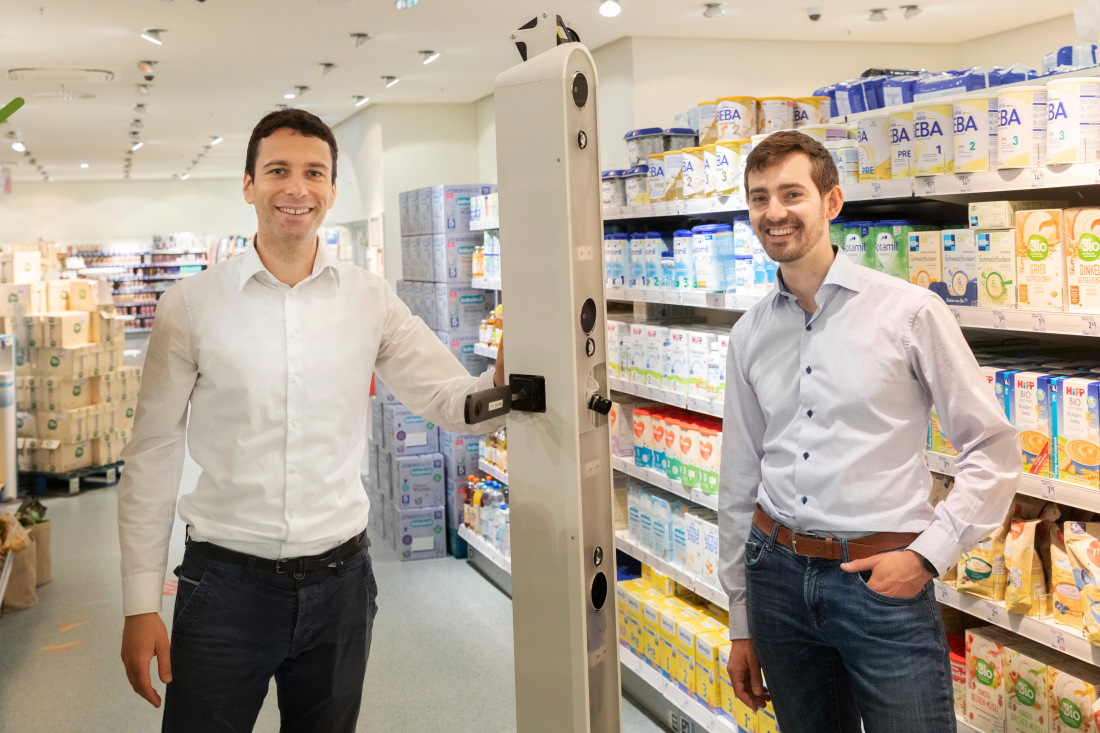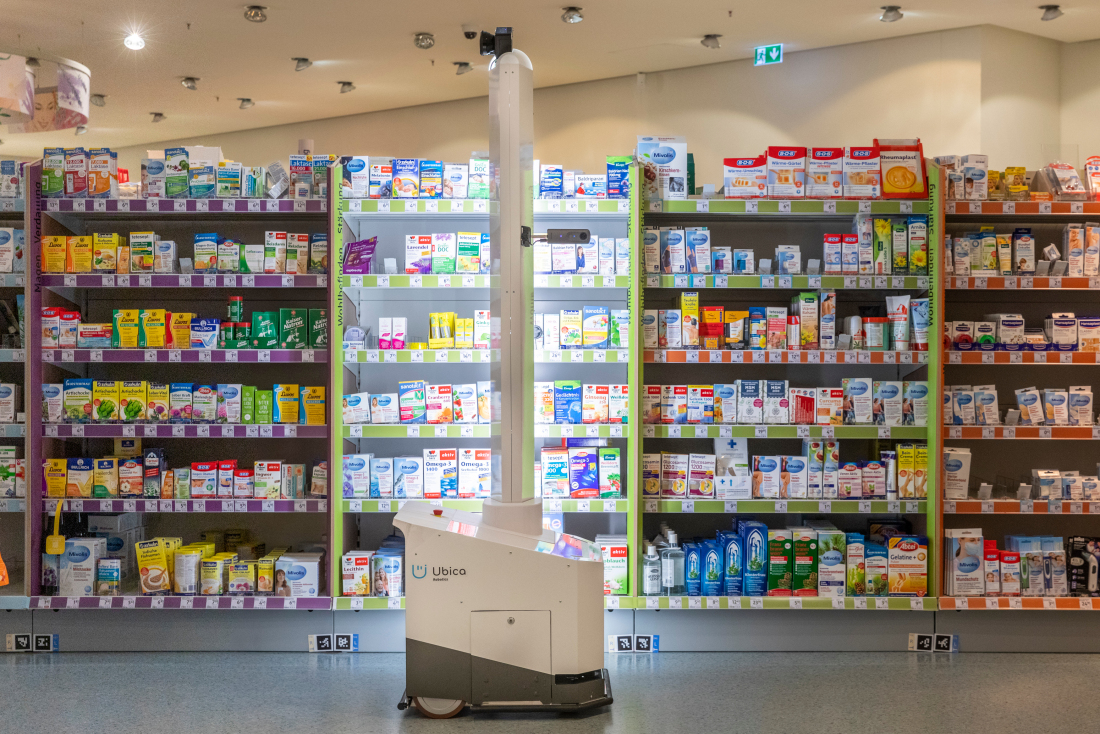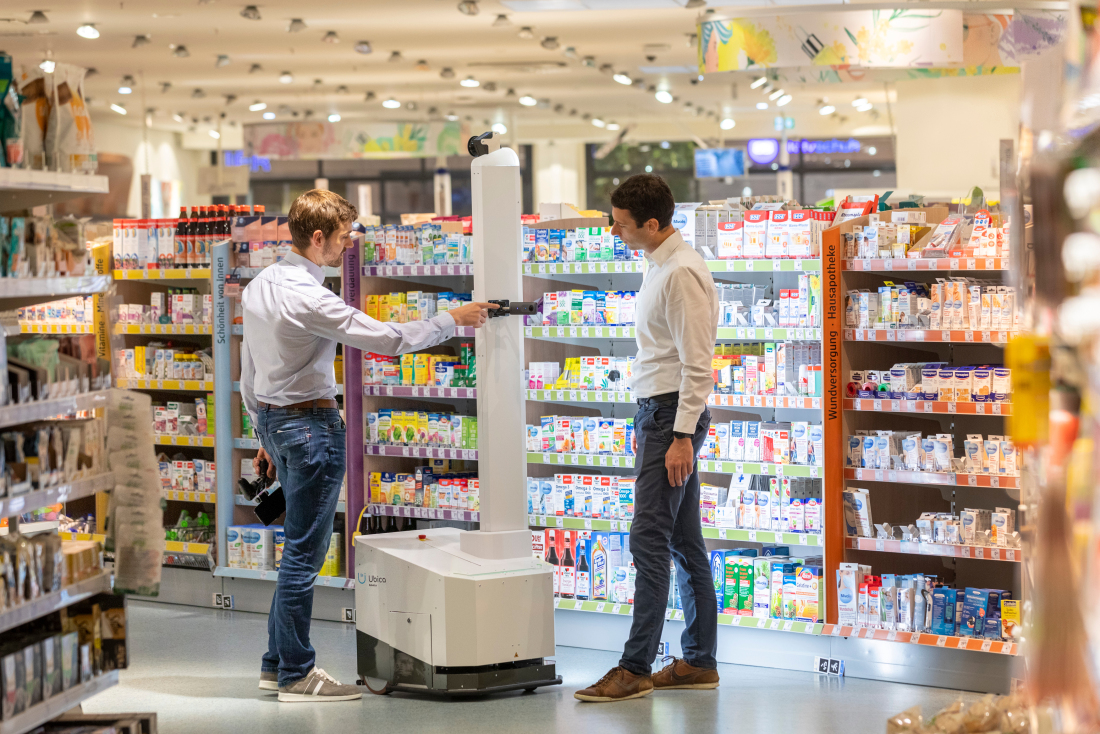What Happens In the Supermarket at Night
StartupsBremer start-up develops robot to boost over-the-counter retail trade

The "rolling colleague" is two meters tall and weighs in at 60 kilos. Its job doesn't start until the last member of staff leaves the store at the end of the working day: as soon as the entrance door is locked, the "robot colleague" automatically leaves its charging station, switches on its lights and cameras, and moves purposefully through the store. Aisle after aisle, it scans the shelves, "remembering" where products are and what quantities of each item are present. At the end of its rounds, the robot's camera systems and artificial intelligence have created a digital image of the stock levels throughout the entire store: an image which is built up again every night.
"This "digital twin" creates a completely up-to-date image of the store with a level of detail that impossible to find anywhere else today", explained Jonas Reiling (32), Managing Director of Bremen start-up Ubica Robotics, as he described the unique feature of the robot. "Until now, over the counter retailers have not been able to use their potential to the full, simply because this data was unavailable. Our robots will help change that and improve the ability of physical stores to compete with online retailers."
Robots give human employees more time for talking to customers
On the very first day that a branch of a supermarket or a chemists opens, the shop workers know exactly which products they have, where they are and what quantities are present. However, investigations by Reiling and his co-founder Georg Bartels (35) have revealed that, over time, the situation on the ground slips further away from the plan. "Items are not posted correctly at the cash desk, things get broken or stolen, there are delivery errors or goods aren't placed on the correct shelf", stated Bartels, who is also a Managing Director. "As a result, an average of 60 percent of the stock in the stores is not recorded correctly." This is exactly the problem that new technology can address, and so help retailers become more efficient by optimising supply chains and in-house processes.
"No one is capable of counting thousands of items every day, and remembering their exact position", said Bartels. "Even the annual stock take isn't free of errors." However, robots shouldn't be seen as competition for human employees. Quite the contrary, the robots are there to support them: "Our aim is to make working in over the counter retail more attractive, because members of staff can spend more time helping and advising their clientèle. And that can only happen if technology can relieve them of the time-consuming job of counting products."

Robots can be used in many different ways
The data collected by robots can be used for a multitude of different purposes, say the founders. A current example of this is the "Click and Collect" method of shopping that has become so popular during the Corona pandemic: The "digital store twin" can save employees a lot of time when they're walking around the shop collecting up the goods ordered online by the customer. "We can foresee a scenario in which an employee is given the order as a list on their smartphone, and the items on the list are displayed in a sequence that takes the employee around the shop to collect them on the shortest possible route", explained Jonas Reiling.
In future, the system will also be able to reorder products that the robot's nightly rounds reveal to be missing automatically. And although employees are currently still tasked with having to find and remove the labels from weekly offers when those offers expire, new technology could also help them by providing exact information and optimised routes through the store. "There really are very many different ways in which we can simplify processes in these stores", emphasised Reiling.
The Ubica Robotics team is expanding rapidly
The idea for this autonomous scanning robot technology is based on the results of a European research project. The aim of this project was to improve logistics processes within supermarkets. The working group for artificial intelligence (AI) at the University of Bremen was involved in this project, as were Reiling and Bartels, who participated in it as members of scientific staff. Together with their university colleagues, Ferenc Bálint-Benczédi and Alexis Maldonado, they founded Ubica Robotics in May 2020, as a technology spin-off company from the University. With the help of financial support from the EXIST development programme run by the German Federal Ministry of Economics, the founders have been able to expand their team. Currently, it mainly consists of software developers, and it now has seven members of staff plus twelve in-house trainees. "The demand is simply enormous", said Jonas Reiling. "We're confident that we'll be able to create dozens of new positions in the future."
Prototypes are already in use
dm, the German chemists chain, is the first major potential customer to come on board. Two prototypes of the Ubica scanning robot are regularly being used in test runs in dm branches. "The robot can already do almost everything that's relevant", said Georg Bartels. "We're currently running long-term tests. The aim is to move over to series production in the coming year." The outlook is extremely promising: although, until now, these young entrepreneurs have deliberately not courted publicity, because they wanted to complete the first phase of testing, they have already been approached by other retail chains.

Bremen is the ideal location
These two entrepreneurs, neither of whom are originally from this area, have come to appreciate Bremen as a business location. When setting up their company, they were able to benefit from a range of programmes run by Bremen's positive environment for start-ups, such as the advice provided by Starthaus, the central point of contact for fledgling businesses in the city. As Jonas Reiling says, Bremen is the ideal place for developing a business like theirs: "Here, we have access to people with bright ideas, and the resources of a great AI environment", he explained. "At the same time, the field of robotics in Bremen isn't yet so saturated that it's hard to keep an overview of what's going on. We've been able to create some excellent business connections and are confident that these will pay dividends for us in future."
If everything goes to plan, the founders expect that every branch of their future retail partners will have its own robot rolling through the aisles in a few years time. "If that happens, we're talking about several thousand machines, for which we will provide support and regular software upgrades", said the 35 year-old. "Once we go into series production, our start-up will be breaking new ground for the service robotics industry, and that's an exhilarating prospect."
Success Stories
Bremen’s Economy in Figures: Statistics 2025
The State of Bremen is a strong economic hub. A look at the latest statistics highlights its economic strength — summarising key data such as cargo volumes, export performance, industry turnover, and more.
Learn moreMedium-Sized Companies in Bremen Showcasing the Full Range of the Local Economy
Medium-sized companies form the backbone of Bremen’s economy. They create jobs and produce goods that are in demand worldwide. Here is a selection of ten businesses that illustrate the diversity of Bremen’s economic landscape.
Learn moreTwelve international food and beverage companies in Bremen
Becks and Melitta may be high-profile brands, but international food and beverage companies also manufacture lots of other products in Bremen and Bremerhaven. Here are twelve examples.
Learn more
